Since its establishment in 2018, through its partnerships with Russian universities and think tanks, the Russia and Eurasia Program has provided opportunities for faculty of The Fletcher School to teach short courses to students in Russia.
For news and media about short courses in Russia taught by Fletcher professors, please see the following links:
American Policy Towards The Asia-Pacific: Key Issues And New Sources
 Professor Sulmaan Khan
Professor Sulmaan Khan
Far Eastern Federal University, May 13-17, 2019
This short course seeks to introduce students to American policy towards countries of the North Pacific rim in the past few decades, as well as to the use of recently declassified primary sources. The focus being on American policy, students are expected to read the briefing books at the National Security Archive website (nsarchive.gwu.edu). These mostly zero in on a particular issue; lecture and discussion will elicit the broader context.
Topics in International Relations and Security Policy
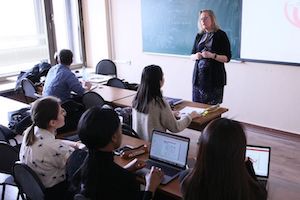 Professor Monica Duffy Toft
Professor Monica Duffy Toft
MGIMO University, March 14-16, 2019
This course examines core issues in international relations and security policy. It is designed to give students a fundamental understanding of physical security and broader dimensions of human security and threats in light of the contemporary challenges states and citizens face around the use of force and violence.
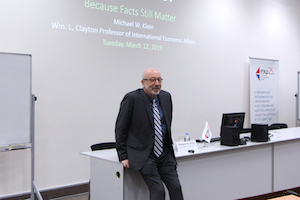 Professor Michael W. Klein
Professor Michael W. Klein
New Economic School, March 12-14, 2019
These three lectures present an overview of empirical analyses of three central topics in International Macroeconomics: exchange rate and capital control regimes; the policy trilemma and the constraints on monetary policy; and the determinants of trade in goods and services.
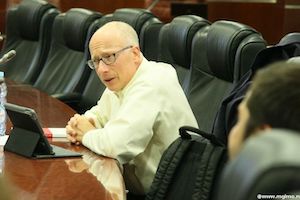 Professor Joel P. Trachtman
Professor Joel P. Trachtman
MGIMO University, May 22-25, 2018
This course provides an introduction to the legal context of international commerce. It examines the international legal system, and focuses on international trade law as a major component of the international legal system, with great relevance for international commerce. It examines selected issues within the international trade law system, including tariffs, discrimination, protectionism, health and environmental protection.
Global Political Economy and Economic Statecraft
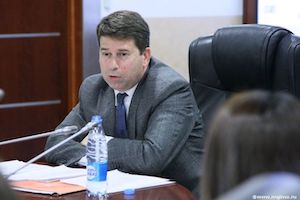 Professor Daniel W. Drezner
Professor Daniel W. Drezner
MGIMO University, May 22-25, 2018
The goal of this short course is to offer an introduction into the world of global political economy and economic statecraft. A good policymaker needs to know about emerging and existing economic structures, as well as the utility of the instruments of economic statecraft. We will discuss theories explaining the global political economy, changes within the 21st century global political economy, the current set of global governance structures, the challenges they face in an age of populist nationalism, the tools of economic statecraft, and the political constraints on economic policymaking.
Processes of International Negotiation
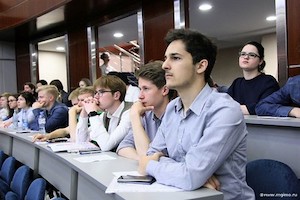 Professor Diana Chigas
Professor Diana Chigas
MGIMO University, May 22-25, 2018
This course explores the processes, rather than specific substantive issues, of international negotiation. In addition to exploring a wide range of issues that confront international negotiators, the course will include an emphasis on building the personal analytic skills of each student. The course will look at practical cases and different possible approaches to the negotiation process.
Diplomacy: History, Theory, and Practice
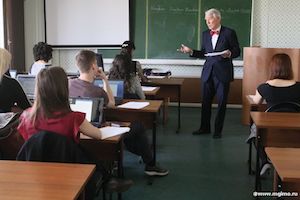 Professor Alan K. Henrikson
Professor Alan K. Henrikson
MGIMO University, April 16-27, 2018
The course will examine: the institution of diplomacy and the social, political, and legal status of the diplomat; the “functional” theory underlying the Vienna Convention on Diplomatic Relations (1961) and the Vienna Convention on Consular Relations (1963); the concept of “diplomatic understanding” and the question of the autonomy and potency of diplomacy, represented in the corps diplomatique; the growing importance of consular services and the reality of “consular diplomacy.” It will trace the historical origins and evolution of diplomacy and the effects on diplomacy, involving women as well as men, with the professionalization of diplomatic services. The course will explore the interplay of bilateral diplomacy and multilateral diplomacy—as conducted by embassies, at summit meetings, during global conferences, and within international organizations. It also will analyze rapid changes that are occurring in the means and method of communicating through diplomacy, including Public Diplomacy (PD) and Cultural Diplomacy (CD), in which non-governmental actors as well as government officials are increasingly involved. The course will culminate in a class simulation exercise based on a United Nations Security Council meeting called in order to address a current regional problem (the tense situation on the Korean peninsula) having the potential to develop into a major international crisis.
